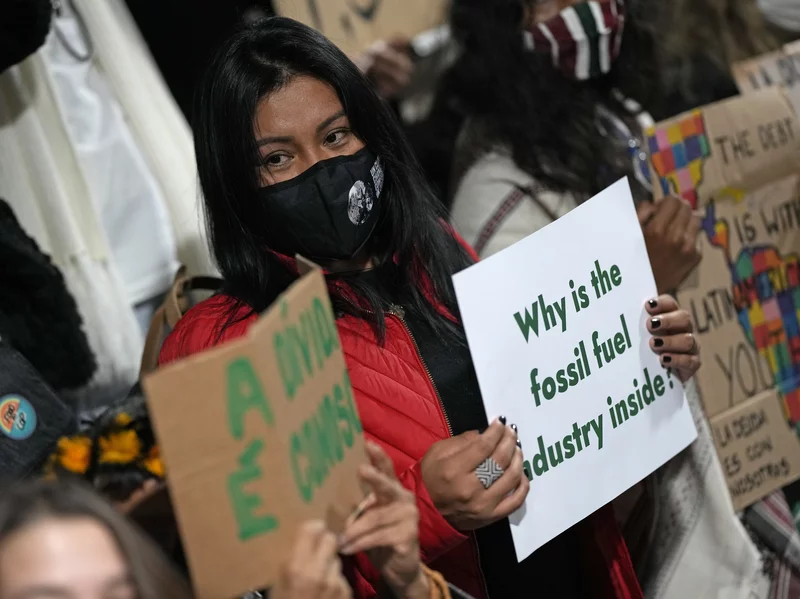Hundreds of fossil fuel lobbyists have flooded the UN climate change summits in recent years. They have become a constant feature of the so-called COPs, while consistent plans for getting to carbon neutrality risk being derailed or spun.
500 fossil fuel lobbyists representing 100 fossil fuel companies
Organized in November 2021 in Glasgow, COP26 opened its gates for at least 500 fossil fuel lobbyists affiliated with some of the world's biggest polluting oil and gas giants. Taken together, these lobbyists were more than any country's delegation. COP stands for Conference of the Parties of the UN Climate Change Conference, and such events are held every year.
Data analysis before COP26 showed that 503 delegates related to the fossil fuel lobby were on the provisional list of named attendees. "If the fossil fuel lobby were a country delegation at COP, it would be the largest with 503 delegates – two dozen more than the largest country delegation", said Global Witness, one of the organizations that conducted the research.
The number refers to the individuals directly affiliated with fossil fuel corporations, including the likes of Shell, Gazprom, and BP, or as members of delegations that act on behalf of the fossil fuel industry.
Over 100 fossil fuel companies were represented by 30 trade associations and membership organizations. The fossil fuel lobby at COP was larger than the combined total of the eight delegations from the countries worst affected by climate change in the past two decades - Puerto Rico, Myanmar, Haiti, the Philippines, Mozambique, Bahamas, Bangladesh, and Pakistan. 27 official country delegations registered fossil fuel lobbyists, including Canada, Russia, and Brazil.
These findings propped up calls in recent years to protect the integrity of the UN's climate negotiations by establishing clear conflict of interest policies. Still, the study counted only lobbyists for the fossil fuel industry, while other polluting industries, such as finance, agribusiness, and transportation, also sent their representatives.
IETA turned out in force in Glasgow
One of the biggest groups identified was the International Emissions Trading Association (IETA), with 103 delegates in attendance. IETA is backed by many major oil companies that promote offsetting and carbon trading to allow them to continue extracting oil and gas. According to Global Witness, IETA has an "enormous number" of fossil fuel companies as its members. Its agenda is driven by fossil fuel companies and serves the interests of fossil fuel companies.
When questioned why the event's organizers had allowed so many people from the industry to attend, COP26 President Alok Sharma said: "At the end of the day, it is up to parties and observers who gets accreditation as part of their delegations."
Patricia Espinosa, Executive Secretary of the UN's climate agency, claimed the UN did not invite or acknowledge any official delegation of fossil fuel companies, as the agency had no control over which people each country registered as a delegate. "It is really the sovereign right of every government to accredit every representative as part of its delegations, persons it deems appropriate," Espinosa said, according to CNN. "We do not allow open lobbying or open promotion of oil and gas; of course, that would be against the objectives of the Paris Agreement and the convention."
"An orchestrated PR scam"
The realities of the COP26 pushed conservationist Stephen Barlow to develop a robust analysis that echoed his insights from observing climate conferences over three decades, with one stark conclusion: "an orchestrated PR scam."
"After the 1992 Rio Earth Summit, political leaders, fossil fuel companies, and general vested interest gave the impression the problem was fixed, that there was no need for people to turn to green politics because mainstream politics had fixed the problem. In the following years, in the 1990s, we had oil companies taking out big full-page adverts in BBC Wildlife Magazine, National Geographic, etc, saying how they were switching their business model to renewables. Politicians presented all these rosy views of green growth, all sorts of carbon trading schemes and generally giving off the impression that the problem was fixed, and the future was green. The problem is, unlike the 1992 Rio Earth Summit, where it took nearly 30 years to find out everything we were promised was a scam and it just kept on getting worse - in 30 years time (in fact far less) we are going to be in serious trouble. This is as evil as it gets. This is an orchestrated PR scam to carry on with business as usual. Where various elements like politicians, the mainstream media, billionaires, royalty and vested interests, combine to maintain business as usual, with fraudulent presentation", concluded Stephen Barlow.









